1. Early life
Luka Modrić's personal background is marked by the profound impact of the Croatian War of Independence, which shaped his early development and resilience.
1.1. Childhood and upbringing
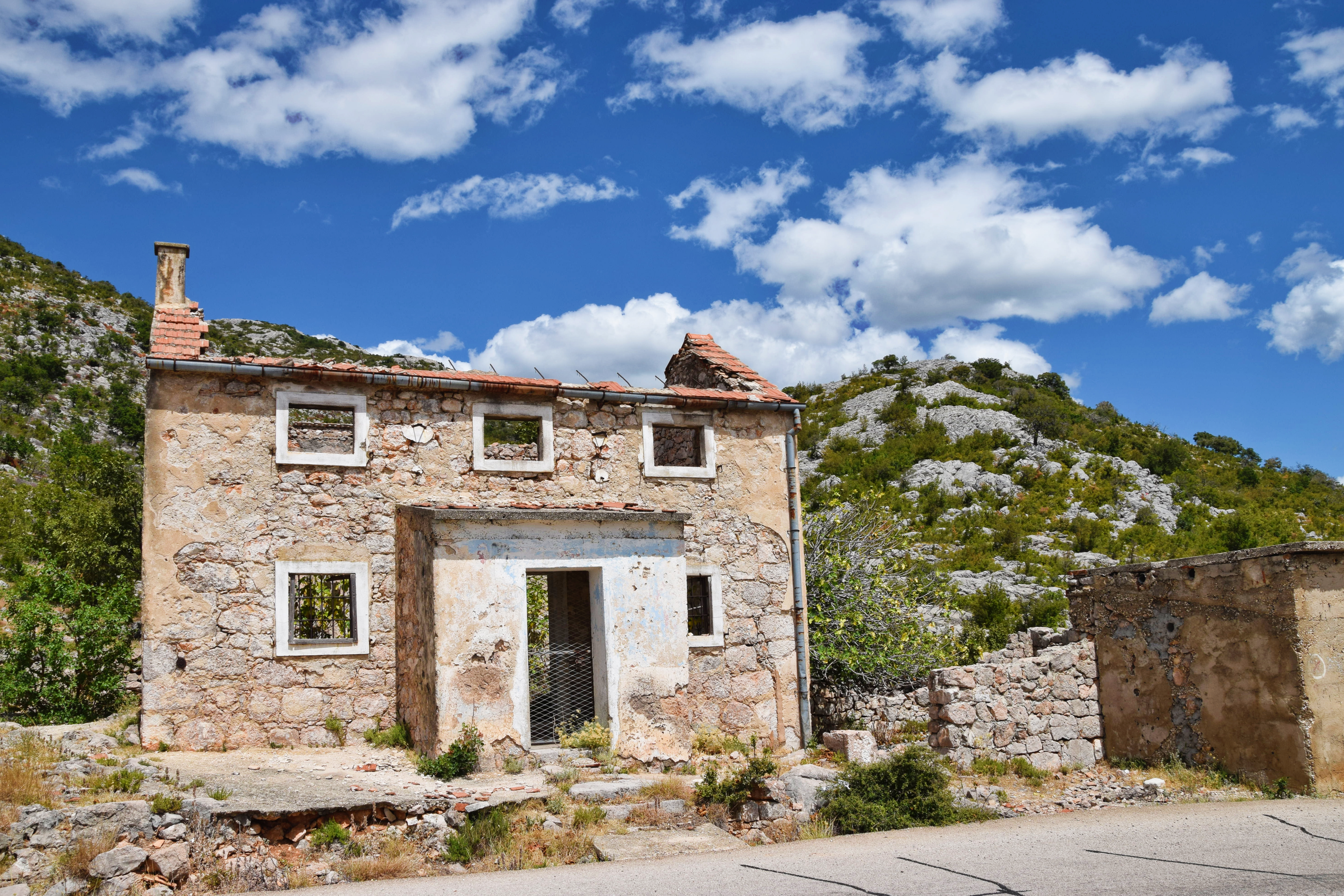
Luka Modrić was born on 9 September 1985 in Zadar, which was then part of the Socialist Republic of Croatia, a republic within Socialist Federal Republic of Yugoslavia. He was raised in the small hamlet of Modrići, part of Zaton Obrovački, located on the southern slopes of the Velebit mountain, north of Zadar. He is the oldest child of Stipe Modrić, who later served as an aeromechanic in the Croatian Army, and Radojka Dopuđ, both of whom initially worked in a knitwear factory.
Modrić spent most of his early years living with his paternal grandparents, Luka (after whom he was named) and Jela, in a small stone house by the roadside above the hamlet of Modrići. This "upper house" was not owned by his family but by the road maintenance company where his grandfather worked. As a five-year-old, he would shepherd goats. However, his childhood tragically coincided with the Croatian War of Independence. In December 1991, as the war escalated, his grandfather Luka was executed by Serb rebels near their house in Modrići, and the house itself was subsequently burned to the ground.
His family was forced to flee their home and lived as refugees in the Hotel Kolovare in Zadar for seven years, before moving to the Hotel Iž, also in Zadar. During these years, thousands of bombs fell on the city. Modrić recalls it as a tough time for his family and credits it with shaping him as a person. However, he also noted that he was mostly unaware of the war's full impact because he befriended many other children, and their parents shielded them from the conflict's worst aspects, focusing on creating a normal childhood for them.
1.2. Early football development
In these challenging circumstances, Modrić began playing football, often in the hotel parking lot. In 1992, he simultaneously started primary school and a sporting academy. The academy fees were paid with the family's limited money, sometimes supplemented by his uncle. As a boy, he was inspired to play football by Croatian legend Zvonimir Boban and Italian playmaker Francesco Totti, even dreaming of playing for A.C. Milan where Boban played.
Supported by his family, Modrić participated in representative camps and trained at his local club, NK Zadar. He was coached by Domagoj Bašić and the head of the youth academy, Tomislav Bašić, whom Modrić considers his "sporting father." Tomislav Bašić notably said that Modrić's father made him wooden shin guards because they had little money, though Modrić later denied this specific anecdote. Due to his small stature and being considered "too young and light," he was not signed by Hajduk Split, the most prominent football club in the Dalmatia region.
After showcasing his talent, including at a youth tournament in Italy, Tomislav Bašić arranged Modrić's move to Dinamo Zagreb in late 2001 when he was 16 years old. After a season with Dinamo Zagreb's youth side, Modrić was loaned in 2003 to Zrinjski Mostar in the Bosnian Premier League. During this period, he developed his versatile style of play and was named the Bosnian Premier League Player of the Year at just 18, later stating, "Someone who can play in the Bosnian Premier League can play anywhere," referring to its physical nature. The following year, he was loaned to Croatian side Inter Zaprešić. He spent one season there, helping the team achieve second position in the Prva HNL and a place in the preliminary round of the UEFA Cup. He also won the Croatian Football Hope of the Year award in 2004. He returned to Dinamo Zagreb in 2005.
2. Club career
Modrić's club career has seen him rise from a promising youth talent in Croatia to one of the most decorated and influential midfielders in the history of European football, particularly during his time at Real Madrid.
2.1. Dinamo Zagreb
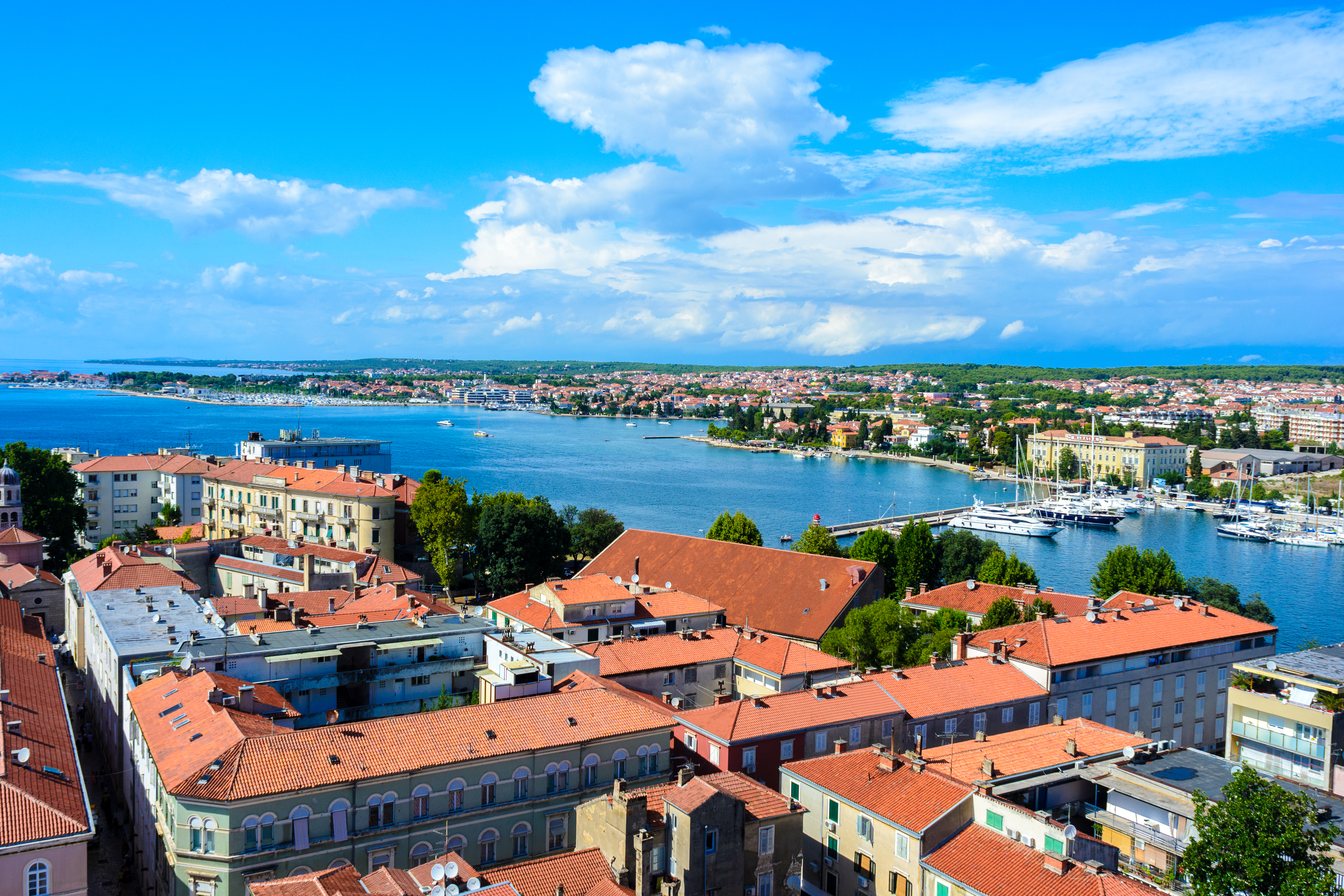
In the 2005-06 season, Modrić signed his first long-term professional contract with Dinamo Zagreb, a ten-year deal. With the earnings from this contract, he purchased a flat in Zadar for his family, ending their refugee status. He quickly secured a place in Dinamo's first team, contributing 7 goals in 31 matches to help the club win the league title. In the 2006-07 season, Dinamo again won the league, with Modrić making a similar impact. He was the main creative force for striker Eduardo and was recognized with the Prva HNL Player of the Year award.
The following season, Modrić was named team captain and led Dinamo's efforts to qualify for the 2007-08 UEFA Cup. In the final play-off stage, he converted a penalty in the second leg against Ajax; Dinamo ultimately won the match 3-2 after extra time with two goals from teammate Mario Mandžukić, but failed to advance beyond the group stage of the UEFA Cup. In his last home match with the club at Maksimir Stadium, Modrić received a standing ovation from fans, who held up supportive banners. He concluded his four-year tenure at Dinamo with a total of over 31 goals and 29 assists across four league seasons, most notably contributing to Dinamo's victory in the 2007-08 Croatian Cup and their league title win by a record 28-point margin. Despite being courted by major European clubs like Barcelona, Arsenal, and Chelsea, Modrić initially chose to remain with Dinamo.
2.2. Tottenham Hotspur
Modrić's move to the English Premier League marked a new chapter in his career, where he faced initial challenges but quickly established himself as a pivotal player.
2.2.1. Struggle and success in England
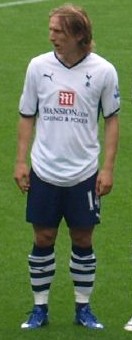
Modrić officially transferred to Tottenham Hotspur on 26 April 2008, becoming the first summer signing for manager Juande Ramos and the first Premier League summer transfer that year. Club chairman Daniel Levy swiftly moved to secure Modrić after Manchester City and Newcastle United expressed interest. Upon signing a six-year contract, Tottenham confirmed the transfer fee was 16.50 M GBP, which equaled the club's record fee. He was assigned the number 14 jersey, a choice he later revealed was in honor of Johan Cruyff. Modrić made his Premier League debut on 16 August in a 2-1 away defeat to Middlesbrough at the Riverside Stadium, which was Tottenham's opening match of the 2008-09 season.
Modrić experienced a slow start at Tottenham, partly due to a knee injury early in his tenure. Sections of the media, including then-Arsenal manager Arsène Wenger, labeled him as too lightweight for the Premier League. Modrić responded to such criticism by stating it "pushes you forward to show people they are wrong. Maybe I look lightweight but I am a really strong person mentally and physically, and I never had any problems with my size." His initial struggles coincided with a period of poor form for the team, causing concern for both himself and Croatia national team head coach Slaven Bilić. Modrić initially played in a number 10 position but was then shifted to the left wing to play alongside Wilson Palacios. Teammate Tom Huddlestone later commented that Modrić's versatility was "probably a blessing and a curse," as he was so good that he sometimes had to play out of position.
The turning point came with the appointment of manager Harry Redknapp. Modrić was given a more familiar role as a central or left-sided midfielder, which allowed him to exert more influence on the team's play and utilize his footballing talents more effectively. This was evident in matches such as the 4-4 draw with arch-rivals Arsenal on 29 October. Redknapp recognized Modrić's value and planned to build his new team around the Croatian playmaker. He scored his first competitive goal for Tottenham on 18 December 2008 in a 2-2 draw against Spartak Moscow during the UEFA Cup group stages. His first Premier League goals came against Newcastle United on 21 December, followed by goals in an FA Cup third-round win against Wigan Athletic on 2 January 2009, and in an away defeat against Manchester United on 25 April 2009. Playing in his preferred central role, Modrić delivered effective performances against Stoke City, Hull City, and most notably on 21 March, when he scored the only goal in a crucial win against Chelsea.
2.2.2. Final seasons in England
Ahead of the 2009-10 season, Harry Redknapp lauded Modrić as "[He's] a hell of a player and a manager's dream... He trains like a demon and never complains, will work with and without the ball on the field and can beat a defender with a trick or with a pass. He could get into any team in the top four." On 29 August 2009, during Tottenham's 2-1 win over Birmingham City, Modrić suffered a suspected calf injury. The next day, it was confirmed he had fractured his right fibula and was expected to be out for six weeks. He made his return on 28 December in a London derby against West Ham United, scoring an 11th-minute goal with the leg he had broken in a 2-0 Spurs victory. He scored again in a home win against Everton on 28 February 2010, and in an away defeat against Burnley on 9 May. On 30 May 2010, Modrić signed a new six-year contract that extended until 2016, stating his commitment to achieving great success with Tottenham.
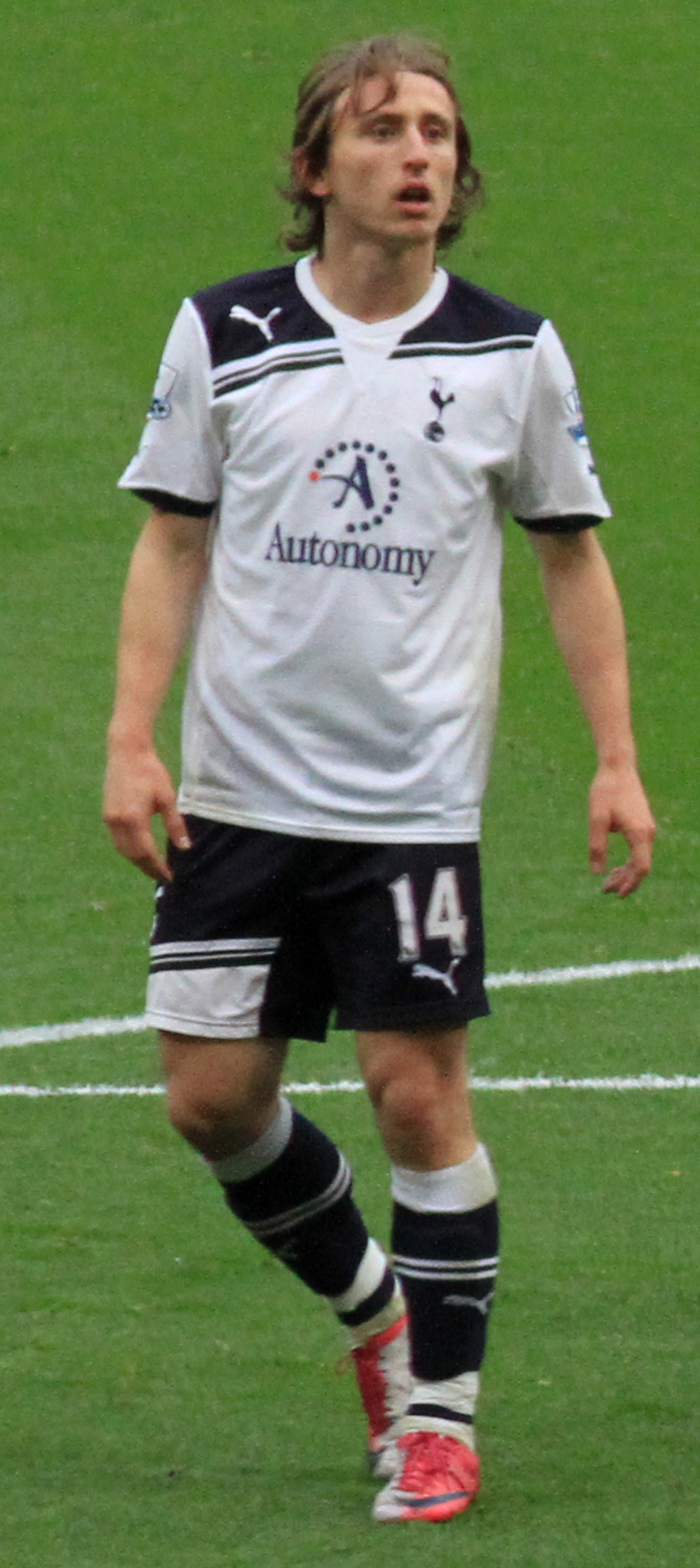
On 11 September 2010, Modrić scored his first goal of the 2010-11 season in a 1-1 away draw at West Bromwich Albion. On 28 November, in a home match against Liverpool, Modrić scored a goal that was later credited as an own goal by Martin Škrtel. Following a draw against Manchester United at White Hart Lane in January 2011, Redknapp praised Modrić, saying, "He was unbelievable. Magnificent. He's an amazing footballer, the little man takes the ball in the tightest areas with people around him, wriggling out of situations. He could play in any team in the world." Modrić also scored in Tottenham's 3-2 victory over Stoke City on 9 April, and converted a penalty at Anfield on 15 May in a 2-0 victory over Liverpool. Modrić was instrumental in Tottenham reaching their first UEFA Champions League involvement. In the first group match against Inter Milan at the San Siro on 20 October, he left the game early due to injury as Spurs lost 4-3 despite Gareth Bale's efforts. In the return match at home on 2 November, Modrić was afforded too much space to dictate the tempo, creating and assisting the first goal by Rafael van der Vaart in a 3-1 victory. He then scored Tottenham's second goal in the next match against Werder Bremen on 24 November. After a scoreless draw against Milan, Spurs were eliminated from the competition in the quarter-finals by Real Madrid. Modrić played 32 Premier League matches in the 2010-11 season, scoring three goals and recording two assists. He also made the highest average number of passes per match for Spurs with 62.5 and an accuracy rate of 87.4%. At the end of the season, Modrić was voted the Tottenham Hotspur Player of the Year. Then-Manchester United manager Sir Alex Ferguson even stated he would have chosen Modrić as his Player of the Year for that season.
In mid-2011, Modrić was heavily pursued by Tottenham's London rivals Chelsea, who made initial bids of 22.00 M GBP and 27.00 M GBP, both rejected by Spurs chairman Daniel Levy. Modrić publicly expressed his desire to move, claiming a "gentleman's agreement" with Levy that the club would consider offers from a "big club." Speculation persisted throughout the summer transfer window, culminating in Modrić refusing to play in Tottenham's opening match of the 2011-12 season against Manchester United, which ended in a 3-0 loss. He admitted his "head was not in the right place" due to the transfer saga. On the final day of the transfer window, a 40.00 M GBP offer from Chelsea was again rejected.
After failing to secure a transfer, Spurs manager Harry Redknapp instructed Modrić to focus on his playing, and he was reinstated as a starter. On 18 September, he scored his first goal of the season for Tottenham with a shot from 25 yd in a 4-0 home win against Liverpool. On 14 January 2012, Modrić scored the only goal in a 1-1 home draw with Wolverhampton Wanderers. On 31 January, in a 3-1 win against Wigan Athletic, he assisted the first goal with a crossfield pass and scored the second from 20 yd, earning inclusion in the "Team of the Week" for the third time that season. Modrić scored his last goal for Tottenham on 2 May in a 4-1 away win against Bolton Wanderers with a powerful volley from 25 yd.
2.3. Real Madrid
Modrić's tenure at Real Madrid has been marked by a remarkable journey from initial struggles to becoming a global football icon, consistently leading the team to unprecedented success.
2.3.1. Adaptation and early success (2012-2015)
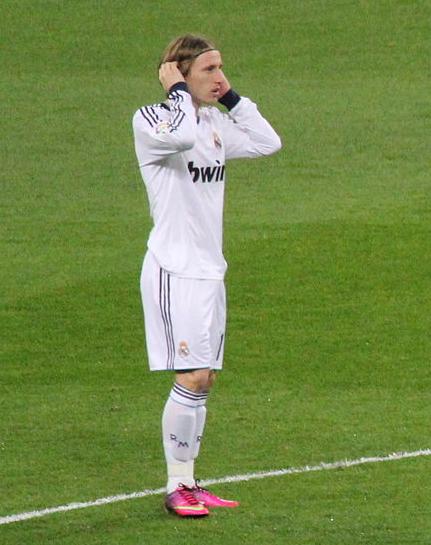
On 27 August 2012, Real Madrid announced they had agreed a deal with Tottenham for an approximate 30.00 M GBP transfer fee. Modrić signed a five-year contract with the Spanish club. Two days later, he made his Real Madrid debut against Barcelona in the second leg of the 2012 Supercopa de España at the Santiago Bernabéu Stadium, replacing Mesut Özil in the 83rd minute. Madrid won the match, granting Modrić his first trophy with the club just 36 hours after his signing. Despite this positive start, Modrić initially struggled to settle into the team under manager José Mourinho, largely due to his lack of pre-season training caused by the prolonged transfer negotiations. The established presence of veteran midfielders Xabi Alonso and Sami Khedira in defensive midfield, and Özil in offensive midfield, often kept Modrić out of the starting lineup, limiting him to substitute appearances and often playing him out-of-position during his first few months. He played his first UEFA Champions League match for Real Madrid in the group stage against Manchester City on 18 September, which Madrid won 3-2. On 3 November, Modrić scored his first goal for Real Madrid in the last minute of their 4-0 victory over Real Zaragoza in La Liga. His most notable performance that year came on 4 December, when he assisted the first two goals by Cristiano Ronaldo and José Callejón with cross-field passes in a 4-1 victory over Ajax in the Champions League group stage. Despite these contributions, at the end of the year, he was controversially voted as the worst signing of the season by Spanish newspaper Marca.
Modrić started in Real Madrid's home match against rivals Barcelona on 2 March 2013. From a corner kick, he assisted Sergio Ramos to score the winning goal in the 82nd minute, securing a victory in El Clásico. On 5 March, Modrić came on as a second-half substitute during the decisive Champions League knockout leg against ten-man Manchester United at Old Trafford. With Madrid trailing by a goal, Modrić equalized with a long-range shot from 25 yd and played a key role in the remainder of the match, which Real Madrid won 2-1, advancing them to the quarter-finals 3-2 on aggregate. This match is widely regarded as the turning point in Modrić's career at Real Madrid. On 16 March, he delivered another impressive performance against Mallorca, giving Real Madrid the lead with a long-range volley from 30 yd in a 5-2 victory. Modrić started in both Champions League semi-final matches against Borussia Dortmund. In the first leg on 24 April, he played in an attacking midfield position where he had limited impact, and the team lost 4-1. On 30 April, in the second leg's 2-0 victory, Modrić played as the deep-lying playmaker, making precise passes to the attackers and creating several chances, earning him high praise. From March 2013, Modrić's form and influence in the midfield steadily improved, distinguishing him as the player with the most completed passes in his team. On 8 May, he assisted the first goal from a corner and scored the fourth goal in a 6-2 victory over Málaga.
With the arrival of new manager Carlo Ancelotti, Modrić became one of the most frequent starters in the team, often partnered in midfield with Xabi Alonso to provide a balance of defense and attack. He consistently proved to be the team's most efficient passer, averaging 90% accuracy in La Liga, and also having the most ball recoveries among the squad. He scored his first goal of the 2013-14 season in the final Champions League group match against Copenhagen, marking his fifth goal for the club, all scored from outside the penalty area. Modrić scored his first Liga goal in a 3-0 away win against Getafe, his sixth goal from outside the penalty area. Modrić was on the pitch when Real Madrid won the 2013-14 Copa del Rey after defeating Barcelona 2-1 in the final.
In the first leg of the Champions League quarter-finals, Modrić intercepted the ball and assisted Cristiano Ronaldo for the third goal in Real Madrid's 3-0 home victory against Borussia Dortmund. This goal proved decisive as Real advanced with a narrow 3-2 aggregate score despite losing the second leg 2-0. In his 100th appearance for the club, Modrić assisted the first goal in the second leg's 4-0 victory over Bayern Munich in the Champions League semi-final, helping Real Madrid reach the final for the first time in 12 years. He was included in UEFA's Team of the Week for both legs of the semi-final. On 24 May, in the final, Modrić again delivered a crucial corner, assisting teammate Sergio Ramos for a 93rd-minute equalizer against local rivals Atlético Madrid. Real went on to win 4-1 in extra time, securing the club's tenth Champions League title, famously known as La Décima (meaning 'the Tenth'). He was subsequently included in the UEFA Champions League Team of the Season and received the LFP award for the "Best Midfielder" of the Spanish first division for that season.
In August 2014, Modrić signed a new contract to stay at Real Madrid until 2018. With the departure of Alonso, he was partnered with newly arrived Toni Kroos. Real Madrid began the 2014-15 season by winning the UEFA Super Cup over Sevilla. Modrić provided two assists for Bale, first against Real Sociedad in La Liga, and second against Basel in the Champions League. In the 2-0 away win against Villarreal, Modrić scored his seventh goal from outside of the box.
In late November, Modrić sustained a thigh injury during an international match against Italy, which sidelined him for three months, causing him to miss the FIFA Club World Cup. He returned in early March 2015, starting in seven matches and quickly regaining his form. However, on 21 April, in a 3-1 home win against Málaga, he strained ligaments in his right knee, forcing him out until May. His injury coincided with the end of Real Madrid's 22-match winning run that season. His absence and the lack of a quality substitute were widely seen as primary reasons for Real Madrid's failure to win La Liga and the Champions League that season. Ancelotti himself stated, "Modrić has missed most of the year and this has hurt us." Modrić's critical influence was recognized as he was selected by professional players for the FIFA FIFPro World XI.
2.3.2. Champions League dominance (2015-2018)

For the 2015-16 season, Rafael Benítez replaced Carlo Ancelotti, and under the new manager, Modrić continued to be a key midfield player. He sustained a muscular groin injury during an international match against Bulgaria in October, initially projected to sideline him for two to three weeks. However, he made a swift recovery and was fit for the match against Paris Saint-Germain on 20 October.
With the arrival of new manager Zinedine Zidane in January 2016, the relationship between Modrić and Zidane garnered media attention, with Modrić being described as the "master of the game" and the crucial "connector" between defense and attack. This dynamic was immediately apparent in Zidane's first three matches - wins against Deportivo La Coruña and Sporting Gijón, and a draw against Real Betis - where Modrić was highly praised for his chance creation, positioning, and overall performance and influence. On 7 February, Modrić scored a winning goal from outside the box in a 2-1 away win against Granada. Modrić was a regular starter as the team won the 2015-16 Champions League in the final against Atlético Madrid. He was included in both the Champions League and La Liga's Team of the Season. For the second time, he also received the LFP award for the "Best Midfielder" of the Spanish top league. He was included in the FIFA FIFPro World XI for the second time and, for the first time, in the UEFA Team of the Year (2016).
On 18 October 2016, Modrić signed a new contract with Real Madrid, keeping him at the club until 2020. Due to a left knee injury sustained in mid-September, he missed eight matches, returning in early November. On 18 December, he won the 2016 FIFA Club World Cup with Real Madrid, receiving the Silver Ball for his performances. On 12 March 2017, in a 2-1 win over Real Betis, Modrić played his 200th match for Real Madrid.
Modrić was a regular starter as Real Madrid won 2016-17 La Liga and the 2016-17 UEFA Champions League, where he provided the assist for Cristiano Ronaldo's second goal in the final against Juventus. Modrić was included in the Champions League Team of the Season and became the first Croatian to win the Champions League three times. He also received the UEFA Club Football award for Best Midfielder of the Champions League season. In the competition for the UEFA Men's Player of the Year Award, he finished fourth, while for the 2017 Ballon d'Or, he placed fifth. He was included in the FIFA FIFPro World XI for the third time.
2.3.3. Ballon d'Or and later career (2018-present)
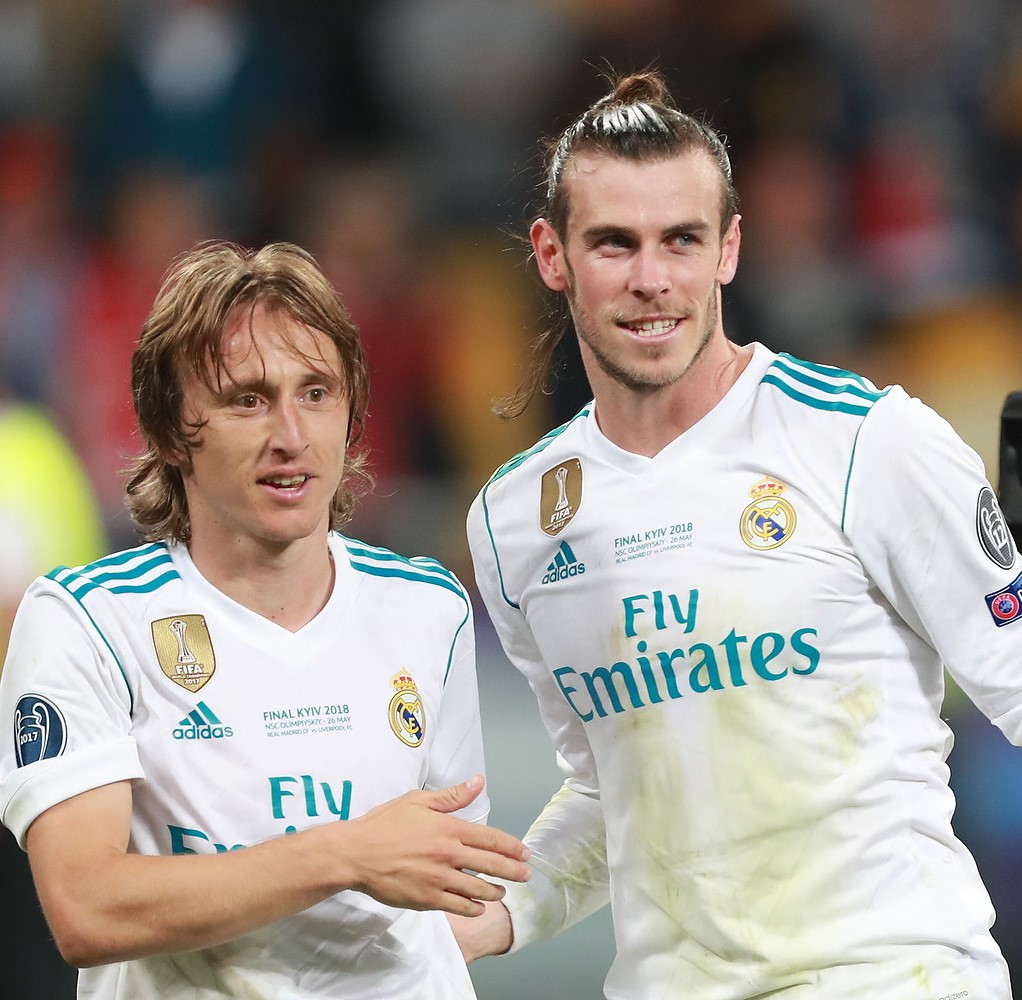
With the departure of James Rodríguez to Bayern Munich, Modrić inherited the team's coveted number 10 jersey for the new 2017-18 season, replacing his previous number 19 jersey. In December, he won the 2017 FIFA Club World Cup with Real Madrid and received the Golden Ball award as the best player of the competition. His first goal of the season came in a 7-1 win over Deportivo de La Coruña on 21 January 2018. In the same month, he was included in the UEFA Team of the Year (2017) for the second time. Modrić was a regular starter when Real Madrid won the 2017-18 UEFA Champions League, starting in the final victory against Liverpool, which saw Madrid win their third consecutive title. For his performances, Modrić was included in the Champions League Team of the Season for the third consecutive time. He later received the UEFA Club Football Award for Best Midfielder of the Champions League season for the second consecutive time.
Due to his stellar club performances and his pivotal role in the Croatia national team at the 2018 FIFA World Cup, where he also received the Golden Ball, Modrić achieved unprecedented individual recognition. In August and September 2018, he won the UEFA Men's Player of the Year Award and The Best FIFA Men's Player Award, respectively. In December, he added the prestigious Ballon d'Or to his personal tally, marking the first time since 2007 that the award was not won by Lionel Messi or Cristiano Ronaldo. This made him the first Croatian player to win these major individual awards. Furthermore, Modrić was the first player to win both the World Cup Golden Ball and the UEFA Men's Player of the Year Award in the same year since Ronaldo in 1998, and the World Cup Golden Ball and the Best FIFA Men's Player Award after Romário in 1994. He is also the first player from the former Yugoslavia territory and the first footballer from Eastern Europe to win a Ballon d'Or since Andriy Shevchenko in 2004. He was the tenth player from Real Madrid to capture the Ballon d'Or, and winning this trophy triggered a clause in his contract, ensuring his stay at the club until 2021. He was also included in the FIFA FIFPro World XI for the fourth time and won the IFFHS World's Best Playmaker award. After receiving the FIFA Men's Player of the Year Award, Modrić stated it "shows that we all can become the best with hard work, dedication, and belief, all dreams can come true." He dedicated the Ballon d'Or to "all the players who probably deserved to win it and didn't" in the past decade, including Xavi, Andrés Iniesta, and Wesley Sneijder.
The arrival of new manager Julen Lopetegui in August 2018 saw Modrić given a steady return to the first team as a substitute due to his lack of pre-season training after the 2018 World Cup. This included a substitute appearance in his team's 2-4 loss after extra time against Atlético Madrid in the UEFA Super Cup. His first start of the season came on 1 September in a 4-1 home win against Leganés, in which he assisted his side's third goal, scored by Karim Benzema. His 100th appearance in a UEFA club competition came on 19 September in a 3-0 home win against Roma, where he assisted the second goal, scored by Gareth Bale. On 22 December, Modrić won his third 2018 FIFA Club World Cup, scoring the first goal and assisting the third in the final against Al Ain. On 13 and 19 January 2019, Modrić for the first time scored in two consecutive league games for Real Madrid, in a 2-1 away win against Real Betis and a 2-0 home win against Sevilla. In the same month, he was included in the UEFA Team of the Year (2018) for the third time in his career. From 27 February to 5 March, Modrić endured what he described as "the most difficult week of his football life," with Real Madrid losing to Barcelona twice and Ajax, consequently crashing out of the Copa del Rey, the La Liga title race, and the Champions League. Despite having had an underwhelming season, he was included in the FIFA FIFPro World XI for the fifth consecutive time.
On 27 August 2019, Modrić celebrated his seventh anniversary with the club. Although questions were raised due to his age (34) and his continued commitment to the national team making him prone to injuries, Modrić stated his desire to "recapture his best form this season." His first goal of the season came on 5 October in a 4-2 home victory against Granada. On 12 November, he was awarded the Golden Foot award. On 23 November, he provided two assists and scored a goal in a 3-1 home victory against Real Sociedad. On 8 January 2020, Modrić scored his fifth goal of the season and 100th career goal with a trivela in a 3-1 victory against Valencia in the semi-finals of the 2019-20 Supercopa de España. On 12 January, he successfully converted a penalty in a shootout as Real Madrid beat Atlético 4-1 on penalties in the final. Following the resumption of La Liga after a three-month suspension due to the COVID-19 pandemic, Modrić was widely praised for being one of Real Madrid's best players despite his age, leading to speculation about a contract extension. On 16 July, he assisted Benzema's opening goal in a 2-1 victory over Villarreal, as Real Madrid secured the league title.
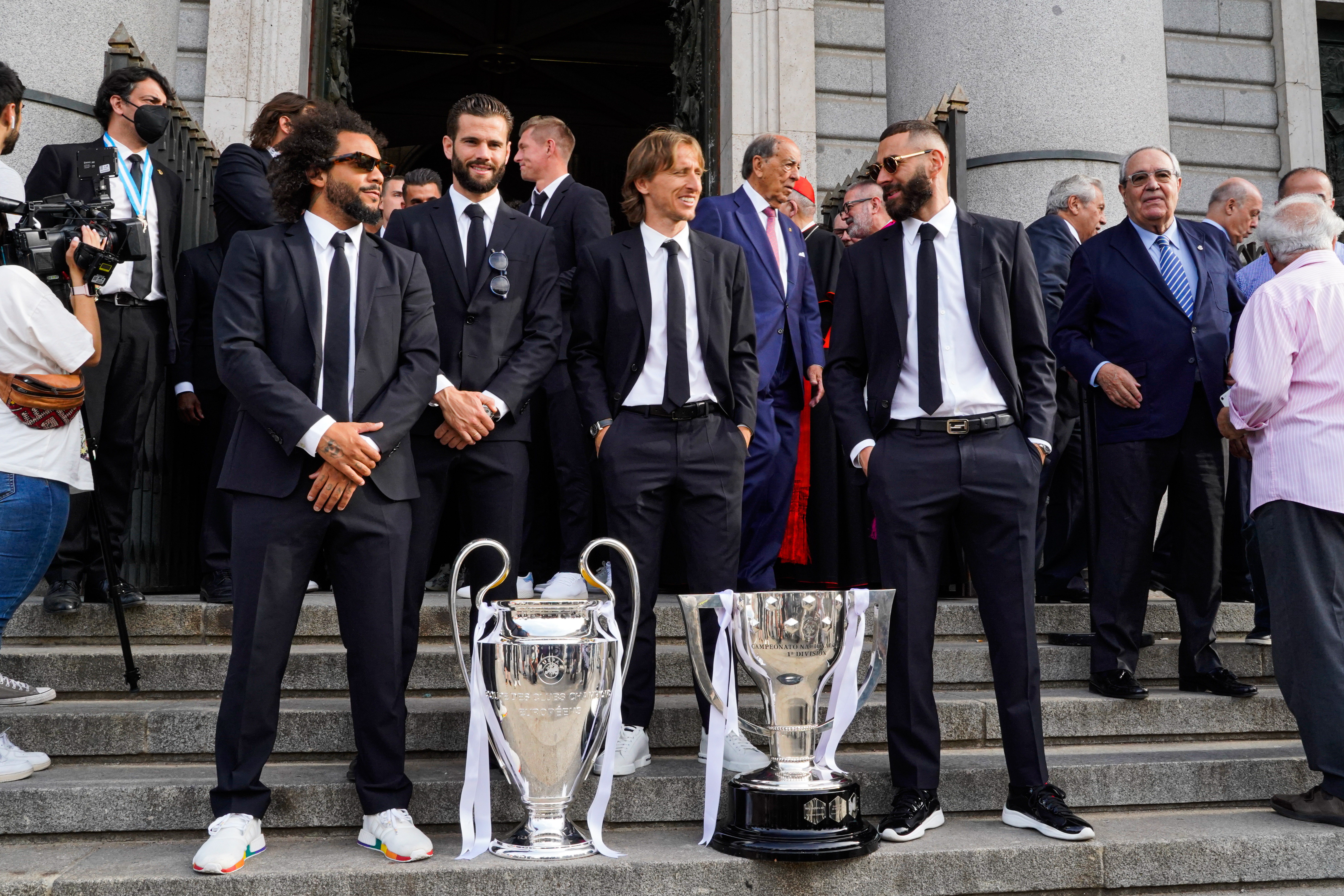
On 21 October 2020, he scored his first goal of the 2020-21 season in a Champions League 3-2 defeat to Shakhtar Donetsk. This goal made him the fourth player in the club's history to score in the competition aged 35 or more, alongside Alfredo Di Stéfano, Ferenc Puskás, and Francisco Gento. It was also named the Goal of the Week by UEFA. Three days later, he came off the bench to score with a trivela his first ever Clásico goal, as Real Madrid defeated Barcelona 3-1. On 25 May 2021, he extended his contract with Real Madrid until 2022.
On 24 October 2021, during the 2021-22 season, Modrić played his 400th game for Real Madrid in a 2-1 Clásico victory. On 30 October, Modrić captained Real Madrid for the first time, receiving the armband from Marcelo upon his substitution, and assisted the winning goal in a 2-1 victory over Elche. On 7 December 2021, he played his 100th Champions League game and was named Man of the Match in a 2-0 victory over Inter Milan. On 16 January 2022, he scored the first goal in the 2022 Supercopa de España Final and was named Man of the Match, as Real Madrid defeated Athletic Bilbao 2-0, making him the oldest goalscorer in the history of the Supercopa de España. On 5 March, Modrić both assisted and scored from outside the box in a 4-1 victory over Real Sociedad. On 6 and 12 April, Modrić provided crucial assists in both legs of the Champions League quarter-finals 5-4 aggregate victory against Chelsea. Praised for his attacking and defensive performances in both games, particularly his long-range trivela assist for Rodrygo in a crucial moment, he was named Man of the Match and voted Player of the Week by UEFA. His assist to Rodrygo was famously called the "pass of the decade" by Ally McCoist and "absolutely perfect" by Thierry Henry. He was a regular starter on 30 April when Real Madrid won their 35th and his 3rd Spanish title, on 4 May when Real Madrid won in extra time in the second leg against Manchester City, and on 28 May when he won his 5th title in the Champions League final. For the sixth time in his career, he was included in the UEFA Champions League Squad of the Season. On 8 June 2022, he renewed his contract until 2023.
On 20 August 2022, Modrić recorded his first goal and assist of the season in a 4-1 away victory over Celta Vigo in a La Liga fixture. On 6 September, he scored in his first Champions League game of the season in a 3-0 away victory against Celtic, becoming the eighth Real Madrid player with 100 appearances in the competition. On 11 September, he became the third Real Madrid player after Puskás and Francisco Buyo to play 100 games while over 35 years of age. In February 2023, Modrić was included for the sixth time in the FIFA FIFPro World XI. On 6 May, he played as a second-half substitute in a 2-1 win over Osasuna in the Copa del Rey final, securing his second trophy in that tournament. In June, he extended his contract until 2024.
During the 2023-24 season, with the departure of Benzema, Modrić became vice-captain of the team. However, he started to receive less playing time in the starting eleven due to a change in formation and competition with younger players like Federico Valverde, Jude Bellingham, Eduardo Camavinga, Aurélien Tchouaméni, and Dani Ceballos. On 28 October, Modrić came on as a second-half substitute and made his 500th appearance for Real Madrid in all competitions in a 2-1 away win against Barcelona, contributing with an assist to Bellingham's last-minute winning goal. On 27 November, in a 3-0 away win against Cádiz, Modrić set the record for most club appearances after 35 years old, with 161 appearances, breaking the previous record he held with Paco Buyo. On 30 April 2024, Modrić came on as a late substitute in the first match of the Champions League semi-final against Bayern Munich and, at the age of 38 years and 234 days, broke the record for the oldest Real Madrid player to make an appearance in the tournament, beating Puskás by five days. A few days later, on 4 May, he became the oldest player to feature in La Liga for Real Madrid, at the age of 38 years and 238 days, breaking another record of Puskás, in a 3-0 win against Cádiz. Furthermore, he clinched his fourth La Liga title with Real Madrid following that victory, thus matching Marcelo, Karim Benzema, and Nacho's record as the club's most decorated player with 25 trophies. He extended his record with his 26th trophy in the Champions League final, following a 2-0 victory against Borussia Dortmund, equaling Nacho's tally. He also became the first player to win six finals in the competition, along with Dani Carvajal.
On 17 July 2024, Modrić extended his contract until 2025 and became captain of the team following the departure of Nacho. A month later, on 14 August, he achieved his fifth Super Cup trophy following a 2-0 victory over Atalanta, becoming the lone most decorated player in the club's history with 27 titles. On 19 October, he became the oldest player to feature in a competitive match for Real Madrid, aged 39 years and 40 days, surpassing Puskás's previous record from 1966 in a 2-1 away victory over Celta Vigo, where he assisted Vinícius Jr.. Later that year, on 18 December, he clinched his record-extending 28th title with the club following a 3-0 victory over Pachuca in the FIFA Intercontinental Cup final. On 3 January 2025, he scored his first goal of the 2024-25 season during a 2-1 away victory over Valencia, becoming the oldest player to score for Real Madrid in all competitions, aged 39 years and 116 days, surpassing Ferenc Puskás's record set in 1966. Additionally, he made his 561st appearance for the club, joining the top ten on Real Madrid's all-time appearances list, equaling the records of both Pirri and Míchel. On 23 February 2025, he was named Man of the Match and scored a half-volley goal from 82 ft (25 m) during a 2-0 away win over Girona FC.
3. International career
Modrić's international career with the Croatia national team has been marked by his enduring leadership and pivotal performances in major tournaments, culminating in historic achievements for his nation.
3.1. Youth national teams and early senior debut
Modrić began his international career at youth level, representing Croatian under-15, under-17, under-18, under-19, and under-21 teams. He made his debut for the under-15 team in March 2001. Though recognized for his talent and psychological maturity, he did not become a regular starter and leading player until he physically strengthened and debuted for the under-18 team. His youth coach, Martin Novoselac, considers him a model for all young players, highlighting his gradual and continuous work and effort, alongside his talent. Modrić made his full international debut for Croatia on 1 March 2006 in a friendly match against Argentina in Basel, which Croatia won 3-2.
3.2. Major tournaments (2006-2016)
Modrić made two appearances at the 2006 FIFA World Cup finals as a substitute in the group fixtures against Japan and Australia. With the appointment of new manager Slaven Bilić, Modrić earned greater recognition at international level; he scored his first goal in Croatia's 2-0 friendly win over world champions Italy on 16 August 2006 in Livorno. Modrić's performances solidified his regular place in the international side, and he delivered successful showings in Croatia's UEFA Euro 2008 qualifying campaign, which included notable home and away victories against England. As a young midfielder, Modrić was often dubbed "the Croatian Cruyff."
Modrić scored Croatia's first goal of Euro 2008, converting a penalty in the fourth minute of their 1-0 victory against hosts Austria on 8 June 2008, becoming the team's youngest ever goalscorer at the European Championships (aged 22 years and 273 days). This was also the fastest penalty ever awarded and scored in European Championship history. He continued to impress, being named UEFA Man of the Match in Croatia's next match when they defeated one of the pre-tournament favorites and eventual finalists Germany. In the quarter-final against Turkey, Modrić capitalized on a mistake by veteran Turkish goalkeeper Rüştü Reçber, crossing to teammate Ivan Klasnić for the first goal of the match with one minute of extra time remaining. However, Semih Şentürk almost immediately equalized for Turkey. In the ensuing penalty shootout, Modrić's kick was off-target, and Turkey won the shootout 3-1. Despite the elimination, Modrić was included in the UEFA Team of the Tournament, becoming only the second Croatian to achieve this honor after Davor Šuker.
In the 2010 World Cup qualifiers, Modrić scored three goals, against Kazakhstan, Andorra, and Ukraine. However, the team failed to qualify, finishing one point behind second-placed Ukraine. After appearing in all of their UEFA Euro 2012 qualifying matches and scoring a goal against Israel, Modrić started in all three of Croatia's group stage matches against the Republic of Ireland, Italy, and Spain. Despite his efforts, the team failed to progress. His most notable performance was against Spain, where Modrić notably picked up the ball on the halfway line, skipped past Spain's midfield trio, and rushed down the right wing to reach the penalty area, evading a defender before delivering a trivela cross from 18 yd to Ivan Rakitić, whose shot was saved by Iker Casillas. Although Croatia did not advance from the group stage, Modrić was included in The Daily Telegraph's best 11 until the semi-finals, and his play was widely praised by critics.
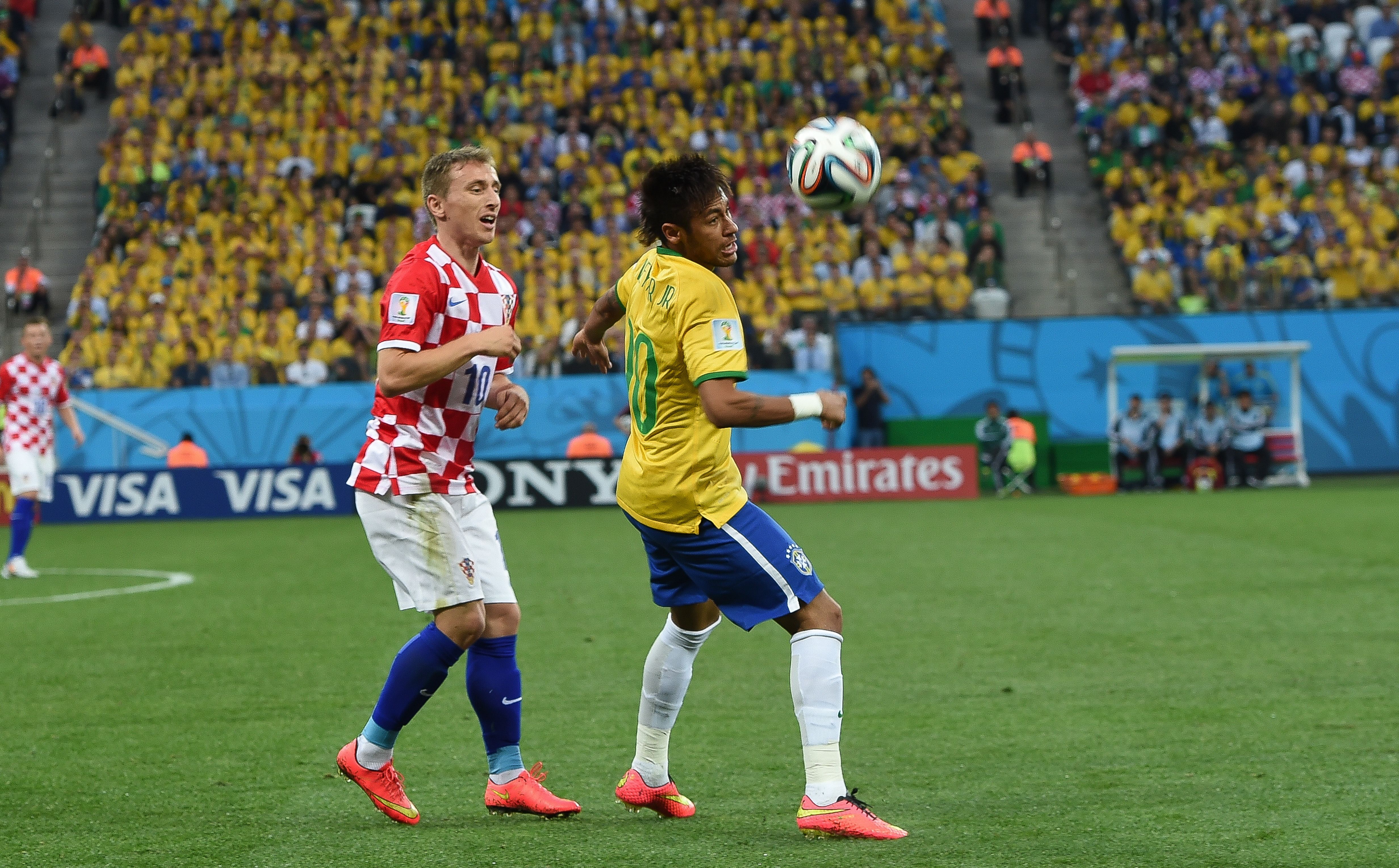
After the playoffs, Modrić and the Croatian team qualified for the 2014 FIFA World Cup. They were drawn into Group A with hosts Brazil, Mexico, and Cameroon. Croatia played the opening match against Brazil, which they lost 3-1, and Modrić sustained a minor foot injury. In the second match, Croatia secured a 4-0 victory against Cameroon, but they failed to progress to the knockout stage after losing 3-1 to Mexico, despite high expectations from the Croatian press and public.
In the Euro 2016 qualifying rounds, Modrić scored his first goals for Croatia in three years: first against Malta on his 29th birthday with a long-range shot, and then a penalty against Azerbaijan. On 3 March 2015, Modrić captained Croatia for the first time, in an away draw against Azerbaijan. In the tournament proper, Modrić scored the match-winning goal in Croatia's opening group stage match against Turkey, a powerful volley from 82 ft (25 m). In doing so, he became the first Croatian to score at the finals of two separate European Championships, having previously scored against Austria in 2008. He was named Man of the Match. Modrić was forced to miss the crucial fixture against Spain on 21 June due to a minor muscle injury. However, Croatia won and topped the group, but they were eliminated in the round of 16 after losing 0-1 to Portugal in extra time.
3.3. World Cup Golden Ball era (2018)
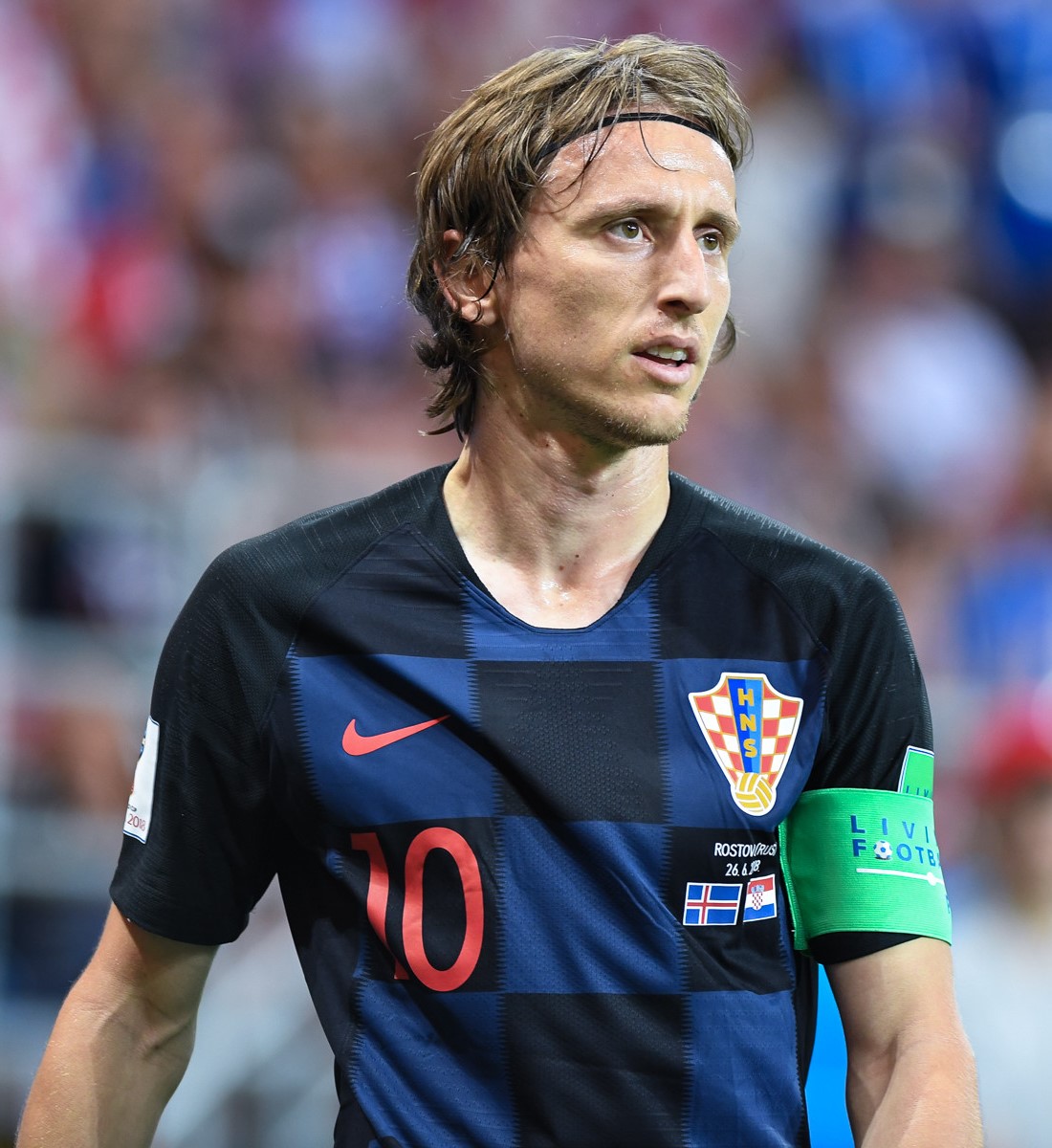
For Croatia's 2018 World Cup qualifying campaign, Modrić became the new team captain, succeeding Darijo Srna's retirement. Croatia began the campaign well, but subsequent 1-0 defeats to Iceland and Turkey, followed by a 1-1 draw with Finland (in which Modrić made his 100th appearance for the national team), severely jeopardized their qualification for the tournament. This prompted Modrić to publicly express his lack of confidence in coach Ante Čačić, who was soon replaced by Zlatko Dalić. Under Dalić, Croatia won their final qualifier against Ukraine 2-0, securing a place in the play-offs. Modrić scored a penalty in the 4-1 victory over Greece in the second qualifying round, enabling his team to qualify for the World Cup.
Croatia were placed in Group D alongside Argentina, Iceland, and Nigeria. During the tournament, Modrić-along with Ivan Rakitić and Mario Mandžukić-were widely referred to as Croatia's second "Golden Generation". In Croatia's opening 2-0 win against Nigeria, Modrić successfully converted a penalty kick and was named Man of the Match. He also scored in Croatia's subsequent 3-0 win over Argentina with a stunning long-range shot from 25 yd, again earning the Man of the Match award. After also featuring in the final group stage match against Iceland, his performances in the first round of the tournament saw him ranked by FourFourTwo, The Daily Telegraph, and ESPN as the best player of the group stage.
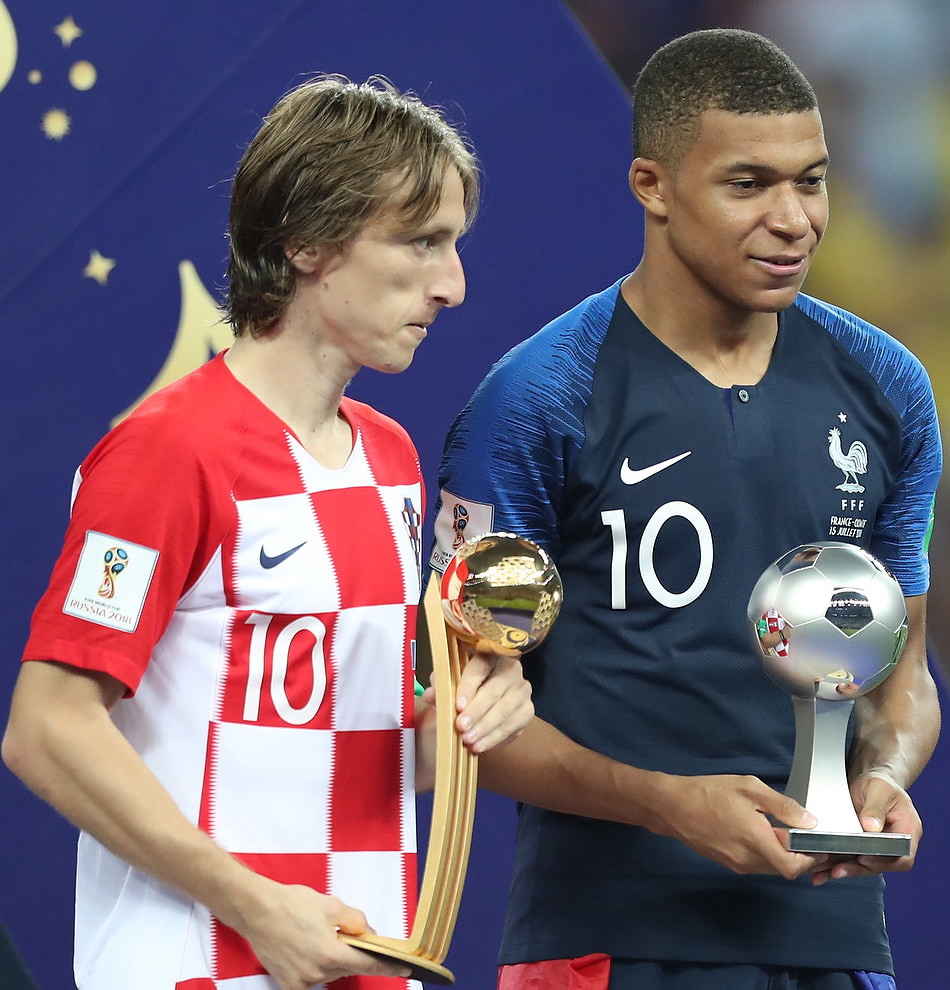
In the round of 16 against Denmark on 1 July, with the score tied at 1-1, Modrić created a goalscoring opportunity for Ante Rebić in the second half of extra-time, who was brought down in the penalty area. Modrić stepped up to take the penalty, but his strike was saved by Kasper Schmeichel. However, Modrić successfully scored his spot-kick during the ensuing penalty shoot-out, and Croatia advanced to the next round following a 3-2 victory on penalties. In the quarter-finals against hosts Russia on 7 July, Modrić provided an assist in extra-time for Domagoj Vida from a corner kick and once again scored in the victorious penalty shoot-out following a 2-2 draw; he was named Man of the Match for the third time in the tournament. In the semi-final against England on 11 July, Croatia advanced to the World Cup final for the first time in their history following a 2-1 victory in extra time. It was reported two days before the final match that Modrić had run the most miles of any player in the tournament and was third in chances created, as well as having the most dribbles per match and completed passes in the opponent's half for his team. Although Croatia were beaten 4-2 by France in the final on 15 July, Modrić was awarded the Golden Ball for the best player of the tournament and was included in the Team of the Tournament. Following the squad's immense welcome in Zagreb, Modrić and his teammates Danijel Subašić, Šime Vrsaljko, and Dominik Livaković were welcomed by tens of thousands of people in their hometown of Zadar.
Modrić participated in all four matches in the inaugural edition of the UEFA Nations League as Croatia finished at the bottom of Group A4 following a historic 6-0 away defeat to Spain in September and a 2-1 defeat to England at Wembley Stadium in November 2018.
3.4. Continued leadership and World Cup Bronze Ball (2019-present)
During the Euro 2020 qualifying rounds, Modrić scored two goals: a penalty in the away 1-1 draw with Azerbaijan and a solo-effort in the home 3-0 victory over Hungary, helping Croatia top the group and qualify for the tournament. However, due to the COVID-19 pandemic, the tournament was postponed for a year. On 24 March 2021, Modrić made his 134th appearance for the national team in a 1-0 2022 World Cup qualifying defeat to Slovenia, equaling Darijo Srna as the most capped player in the history of the team. Three days later, in a 1-0 World Cup qualifying victory over Cyprus, he surpassed Srna's record.
Modrić was selected for the final squad for the UEFA Euro 2020. Despite Croatia's mixed showings in their first two group stage games, Modrić was named the Man of the Match in the second one, a 1-1 draw with the Czech Republic on 18 June. Four days later, in the 3-1 victory over Scotland, he scored Croatia's second goal with a trivela and provided Ivan Perišić with an assist for the third goal, helping Croatia progress to the round of 16. Modrić's goal made him Croatia's oldest ever goalscorer at the European Championships (aged 35 years and 286 days), while simultaneously holding the record for the youngest goalscorer that he set in 2008. Croatia was ultimately eliminated from the competition in the round of 16 after a 3-5 loss to Spain in extra time.
During the 2022 World Cup qualifying, Modrić scored three times and assisted twice in seven appearances. On 13 June 2022, he scored a penalty in a 1-0 away win over France in the 2022-23 UEFA Nations League A, marking Croatia's first ever victory against France. On 25 September, he scored the opening goal in the final group game, a 3-1 away victory against Austria, helping the team advance to the 2023 UEFA Nations League Finals. On 9 November, Modrić was selected for Croatia's final squad for the 2022 FIFA World Cup. In the first and third group stage games against Morocco and Belgium, he was named the Man of the Match. He became the first player to play in both the European Championship and the World Cup in three different decades. In the round of 16 and quarter-finals, Croatia advanced on penalties against Japan and Brazil, with Modrić scoring in the shoot-out against Brazil. He captained Croatia to a second consecutive World Cup semi-final, where they lost 3-0 to Argentina. In the third place play-off, Croatia prevailed 2-1 over Morocco, and Modrić was awarded the FIFA World Cup Bronze Ball.
On 25 March 2023, in a UEFA Euro 2024 qualifying match against Wales, Modrić became the oldest ever player to play a game for Croatia-aged 37 years, 6 months, and 16 days-surpassing Dražen Ladić's record set in 1999. On 14 June 2023, Modrić was widely praised for his performance as he led Croatia to victory over Netherlands (4-2, AET) at the De Kuip in Rotterdam, in the semi-finals of the 2023 UEFA Nations League Finals. In the match, Modrić won a penalty after being brought down by Cody Gakpo, which was converted by Andrej Kramarić. As the game went to extra time, he assisted Bruno Petković for the go-ahead goal and sealed the win by scoring a penalty himself. Modrić was subsequently named Man of the Match. Modrić finished second place as Croatia eventually lost to Spain 5-4 on penalties in the final, in which he successfully converted his penalty.
On 20 May 2024, Modrić was included in the final squad for the UEFA Euro 2024. He became one of only three players to feature in five European Championships. In the last group stage match against Italy, he had his penalty saved by Gianluigi Donnarumma, but scored a goal a minute later, becoming the oldest goalscorer at the European competition, overpassing Ivica Vastić by 32 days. However, he was awarded player of the match, despite a stoppage-time equalizer from Mattia Zaccagni that resulted in a 1-1 draw, which eliminated his team from the tournament.
4. Player profile
Luka Modrić is widely recognized as one of the most complete, effective, and well-rounded midfielders of all time, celebrated for his unique blend of technical skill, tactical intelligence, and tireless work rate.
4.1. Style of play
"Not only is he a very hard worker, he has a good brain and he provided some calmness and composure to the midfield. His passing was neat and his contribution was outstanding. He was not only winning the ball, he was passing well. We thought that he was very influential. He did not just work hard, he made the other people play well around him." -Gérard Houllier, UEFA Technical Team
A diminutive and technically gifted midfielder, Modrić is typically deployed as a creative playmaker and sets the tempo of the match by controlling possession from the middle of the pitch. He has been widely applauded by many footballing pundits, managers, and fellow players for his swift and accurate passing, often utilizing both feet, and his long-range shots, which are often executed with the trivela technique. His composure under pressure and ability to evade tackles are also key attributes. He is also noted for his tactical intelligence and versatility in both attack and defense, as well as his exceptional vision, interpretation of space, and relentless work rate. A former attacking midfielder, Modrić is considered a veteran of the "pre-assist" or build-up play, often creating space and time for his teammates to shoot or deliver goal-bound passes to other players. He is also highly effective at taking set pieces, particularly corners or wide free kicks.
Modrić has been integral to the success of both Real Madrid and the Croatia national team, earning numerous individual honors for his contributions. His unique playstyle has earned him several nicknames from the media and fans, including "the midfield maestro," "the magician," and "the puppet master."
4.2. Position and tactical role
Modrić's complex game has brought him consistent success in the clubs for which he has played. Initially a trequartista or attacking midfielder at Dinamo Zagreb and in his early career at Tottenham, in the 2010-11 season, he flourished in a central midfield role as a deep-lying playmaker (regista) who conducts the attack and creates chances for teammates. Modrić later acknowledged the role that Harry Redknapp played in shaping his deep-lying style, saying that dropping back enabled him "to read the game better" and display his full "creativity." Although primarily a central midfielder, Modrić is also a hard-working player who has been seen to adopt a defensive midfield role in addition to playmaking, tracking back to win the ball from the opposition and prepare for a counter-attack, making him one of the most versatile players in the world, capable of playing in several midfield positions. According to Jonathan Wilson, in a 4-2-3-1 system, Modrić is a third type of holding midfielder, being "neither entirely destructive or creative," but a "carrier" who - courtesy of his dribbling ability and attacking drive - is "capable of making late runs or carrying the ball at his feet," but in his case, "with a hint of regista." As such, his role has also been likened to that of a mezzala, in Italian football jargon, namely an offensive-minded box-to-box or central midfielder.
The switch to a more deep-lying position reduced his number of assists and goals, as well as his shot per game count (1.2), although his game was no longer based on being a goal threat. Despite this, he had the second-highest count of key passes per game (2.06) in the team, as well as a very high pass accuracy rate (87%), with the highest passes per game count (62.5) in the team, the most long balls per game (5.6), the most successful dribbles (2.2), interceptions (2.5), and the highest tackle (1.9) count per game among others, high statistics which placed him amongst the top midfielders of the Premier League. By the 2011-12 season, statistically, he was among the top-rated central and all-round midfielders across the top five leagues, alongside players like Xabi Alonso, Andrea Pirlo, Bastian Schweinsteiger, and Xavi.
Upon Modrić's arrival to Real Madrid, his midfield position was described as numbers six (defensive), eight (central), or ten (attacking), depending on the tactics, and his role was described as the second deep-lying pivot alongside Xabi Alonso in the 2012-13 season, a classic deep-lying playmaker whose creativity was needed to dictate his team's play and unlock the opposing defense. in the first half of the 2013-14 season, during which he formed an effective central midfield partnership with Alonso and Ángel Di María, Modrić made more tackles (56) than any other Real Madrid player in La Liga, with an average of 2.86 tackles per match. He also made the most completed passes (878) in the opposition half of the pitch among Real Madrid players, with the highest passing accuracy in La Liga (90%), which was also the highest among any midfielder in Europe's top five leagues who had made five or more assists during the season. In the 2014-15 season, with the arrival of Toni Kroos, Real Madrid no longer had an effective and natural ball-winner alongside their playmakers in midfield, while the team possessed many attackers. Therefore, in addition to producing the highest count of passes (60.7-64.7) and key passes per match (0.8-1.2) within the team, both Modrić and Kroos had more defensive responsibility to set the rhythm of the team's gameplay in midfield and orchestrate counterattacks. Modrić's average passing accuracy during the season was between 91.6% and 92%, while his highest completion rate in a single match occurred in October against Barcelona when he completed all 42 attempted passes. For all of 2014, Modrić's dribble attempts (75) at a success rate of 76% were second in Europe's top five leagues. During the 2015-16 season, although he placed only 12th in terms of chances created, almost all players above him were either forwards or attacking midfielders with no defensive responsibilities.
4.3. Critical reception
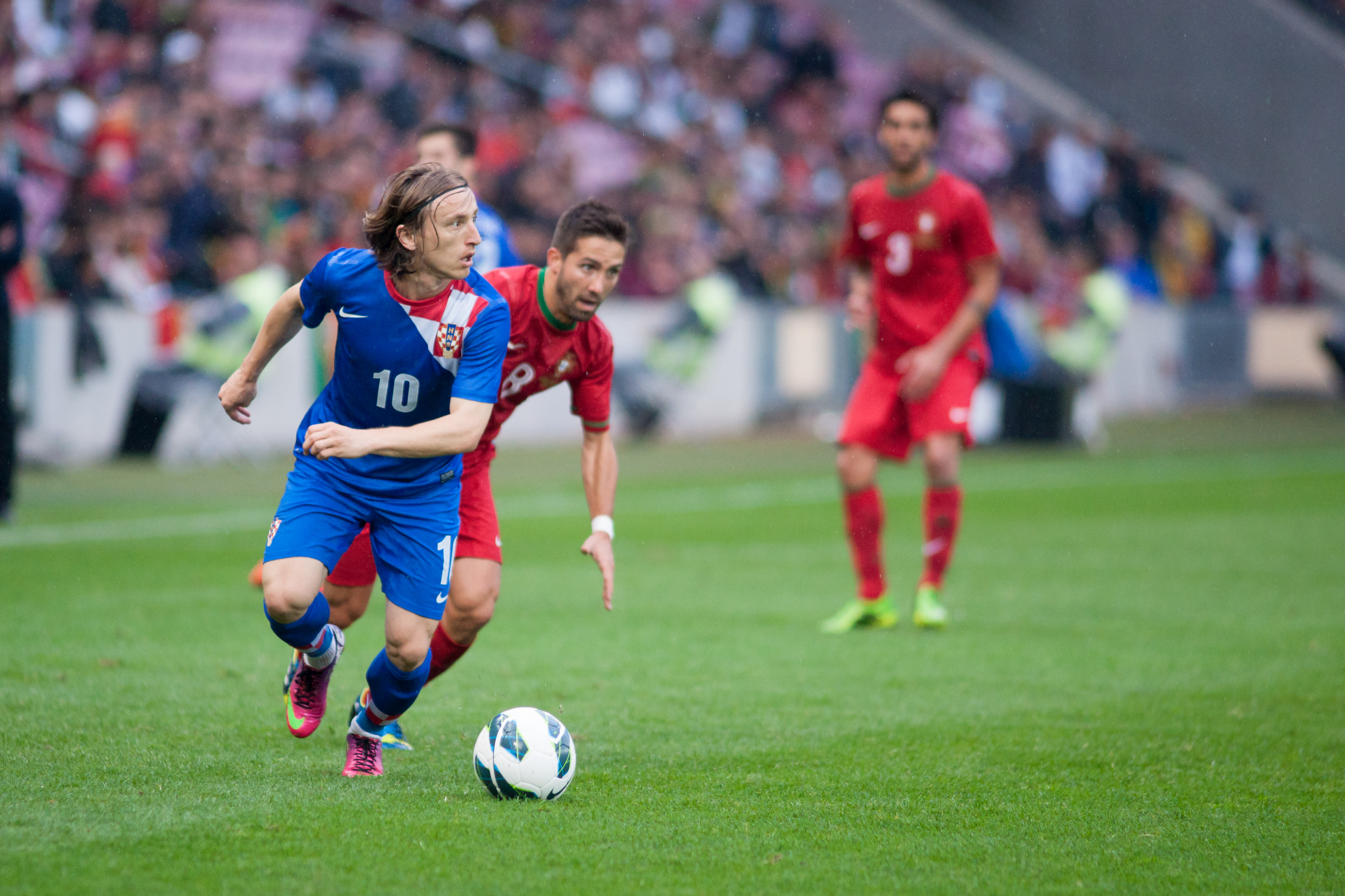
Modrić is widely regarded as one of the best and most well-rounded and effective midfielders of all time. According to Jonathan Wilson, what sets Modrić apart from traditional playmakers is his simultaneous focus on defensive and attacking duties. Due to his footballing intelligence, skill, and fair play, he has been compared to legendary midfielders such as Paul Scholes, Xavi, Andrés Iniesta, and Andrea Pirlo. In his youth, he was also compared to Johan Cruyff, while his main influences were compatriot Zvonimir Boban and Italian playmaker Francesco Totti.
He has been consistently praised for being an essential part of his team's victories, especially in the most important tournaments. For example, his performance against PSG in the second leg of the round of 16 in the UCL in 2022 was called one of the "most imperious midfielder performances." He was praised for his touch, playmaking skills, passing, defense, and vision, with his efforts being essential to Real Madrid's win. Another match in which he gained praise was in the 2022 FIFA World Cup, where Modrić provided another standout performance to help Croatia beat favorites Brazil in the quarter-finals.
He has been consistently praised by some of the sport's most experienced managers, including Johan Cruyff, Alex Ferguson, Pep Guardiola, and Sven-Göran Eriksson among others. From those who managed him, José Mourinho stated he wanted Modrić in Real Madrid because of his influence on the game, tactical level, and his "artistic sense." Carlo Ancelotti praised Modrić's technique and versatility, calling him "one of the best midfielders in the world right now, because he can play in more than one position." Zinedine Zidane included him in his best XI currently playing the game and, in 2016, predicted that Modrić would win the Ballon d'Or. Slaven Bilić said Modrić "is a player who makes others better; they all benefit from him being in the team. He's not selfish, he's playing for the team... he's a complete player; good in defense, good in offense-it looks like he was born with the ball at his feet."
Modrić is unanimously considered the greatest Croatian footballer of all time by his fellow countrymen, including figures like Robert Prosinečki and Davor Šuker. Predrag Mijatović considered him the best footballer in the history of the Balkans, while Andrés Iniesta, Andriy Shevchenko, Rio Ferdinand, and Jan Oblak have called him one of the greatest midfielders to ever play the game. It is considered that his international recognition has significantly contributed to the nation branding of Croatia, the place branding of Zadar, and the further recognition of the Croatia national football team under his captaincy.
Modrić is generally quiet and reserved off the pitch, preferring a low-profile personal life. However, teammates have noted his sharp observation skills and his ability to be a passionate leader on the field. He has stated that while he is naturally quiet, he transforms on the pitch, becoming fearless and driven by the joy of football and a strong dislike for losing. He has a ritual of always putting on his left boot first before a match and wearing a cross necklace given to him by his father at age 18.
5. Personal life
Luka Modrić generally maintains a low profile outside of football, focusing on his family life.
Modrić married Vanja Bosnić in May 2010 in the Croatian capital Zagreb in a private ceremony after four years of dating. A year later, they held a religious ceremony in a Catholic Church. They have three children: a son, Ivano (born 6 June 2010), and two daughters, Ema (born 25 April 2013) and Sofia (born 2 October 2017). Modrić is a cousin of Australian footballer Mark Viduka, and the godfather of Mateo Kovačić's son, Ivan.
In late 2019, Modrić released his autobiography Moja igra (Moja igraMy GameCroatian), co-written by prominent Croatian-Italian sports journalist Robert Matteoni. The autobiography notably emphasizes Modrić's childhood, detailing his upbringing in war conditions and the development of his football career, with core themes revolving around football, family, and friends.
In 2022, FIFA, in collaboration with Fulwell 73, released Captains, an eight-part sports docuseries that followed six national team captains, including Modrić representing Croatia, during their respective 2022 FIFA World Cup qualification campaigns. The series was released by Netflix and also streamed on FIFA's own platform, FIFA+.
6. Legal issues
Modrić has faced legal controversies related to his transfers and testimony, which drew significant public attention in Croatia.
In March 2018, Modrić was called as a witness in an embezzlement and tax evasion trial against Zdravko Mamić, a former executive of Dinamo Zagreb. Throughout the mid-late 2000s, Modrić had signed multiple contracts with Mamić. It was alleged that Modrić had annexed most of his Tottenham transfer fee to Mamić because Mamić had acted as the broker for the move and provided Modrić with financial backing early in his career. Modrić was charged with perjury for allegedly stating in court that he signed the annexe clause of his contract in 2004 (the year of his first professional contract), contradicting earlier statements that he signed it ten years later (in 2017). Facing the judge, he maintained, "I came here to state my defense and tell the truth, like every time so far. My conscience is clear."
The Croatian Football Federation publicly supported Modrić during this period. However, a segment of the Croatian public, frustrated with pervasive corruption in Croatian football, viewed the alleged perjury as an attempt to protect Mamić and became critical of Modrić. Despite this scrutiny, international news outlets often praised Modrić for his ability to perform at a world-class level with the Croatian team during the 2018 FIFA World Cup, even with the immense stress of his legal situation. In October and December 2018, the perjury charge against Modrić was ultimately rejected by the Croatian courts. Separately, Spanish tax authorities had accused Modrić of tax evasion totaling 877.28 K EUR between 2013 and 2014, channeled through a shell company in Luxembourg registered under his wife Vanja's name. Modrić later admitted to tax fraud and agreed to pay a fine of 348.29 K EUR (40% of the evaded amount) and an additional fine of 60.00 K EUR (250 EUR per day for an eight-month suspended prison sentence) to avoid incarceration.
7. Career statistics
7.1. Club statistics
| Club | Season | League | National cup | League cup | Continental | Other | Total | |||||||
|---|---|---|---|---|---|---|---|---|---|---|---|---|---|---|
| Division | Apps | Goals | Apps | Goals | Apps | Goals | Apps | Goals | Apps | Goals | Apps | Goals | ||
| Dinamo Zagreb | 2003-04 | Prva HNL | 0 | 0 | 0 | 0 | - | - | - | 0 | 0 | |||
| 2004-05 | Prva HNL | 7 | 0 | 1 | 0 | - | - | - | 8 | 0 | ||||
| 2005-06 | Prva HNL | 32 | 7 | 1 | 0 | - | - | - | 33 | 7 | ||||
| 2006-07 | Prva HNL | 30 | 6 | 7 | 1 | - | 6 | 0 | 1 | 1 | 44 | 8 | ||
| 2007-08 | Prva HNL | 25 | 13 | 8 | 1 | - | 12 | 3 | - | 45 | 17 | |||
| Total | 94 | 26 | 17 | 2 | - | 18 | 3 | 1 | 1 | 130 | 32 | |||
| Zrinjski Mostar (loan) | 2003-04 | Bosnian Premier League | 25 | 8 | - | - | - | - | 25 | 8 | ||||
| Inter Zaprešić (loan) | 2004-05 | Prva HNL | 18 | 4 | - | - | - | - | 18 | 4 | ||||
| Tottenham Hotspur | 2008-09 | Premier League | 34 | 3 | 2 | 1 | 4 | 0 | 4 | 1 | - | 44 | 5 | |
| 2009-10 | Premier League | 25 | 3 | 7 | 0 | 0 | 0 | - | - | 32 | 3 | |||
| 2010-11 | Premier League | 32 | 3 | 2 | 0 | 0 | 0 | 9 | 1 | - | 43 | 4 | ||
| 2011-12 | Premier League | 36 | 4 | 3 | 0 | 0 | 0 | 2 | 1 | - | 41 | 5 | ||
| Total | 127 | 13 | 14 | 1 | 4 | 0 | 15 | 3 | - | 160 | 17 | |||
| Real Madrid | 2012-13 | La Liga | 33 | 3 | 8 | 0 | - | 11 | 1 | 1 | 0 | 53 | 4 | |
| 2013-14 | La Liga | 34 | 1 | 6 | 0 | - | 11 | 1 | - | 51 | 2 | |||
| 2014-15 | La Liga | 16 | 1 | 0 | 0 | - | 6 | 0 | 3 | 0 | 25 | 1 | ||
| 2015-16 | La Liga | 32 | 2 | 0 | 0 | - | 12 | 1 | - | 44 | 3 | |||
| 2016-17 | La Liga | 25 | 1 | 2 | 0 | - | 11 | 0 | 3 | 0 | 41 | 1 | ||
| 2017-18 | La Liga | 26 | 1 | 2 | 0 | - | 11 | 1 | 4 | 0 | 43 | 2 | ||
| 2018-19 | La Liga | 34 | 3 | 3 | 0 | - | 6 | 0 | 3 | 1 | 46 | 4 | ||
| 2019-20 | La Liga | 31 | 3 | 1 | 0 | - | 6 | 1 | 2 | 1 | 40 | 5 | ||
| 2020-21 | La Liga | 35 | 5 | 0 | 0 | - | 12 | 1 | 1 | 0 | 48 | 6 | ||
| 2021-22 | La Liga | 28 | 2 | 2 | 0 | - | 13 | 0 | 2 | 1 | 45 | 3 | ||
| 2022-23 | La Liga | 33 | 4 | 4 | 0 | - | 10 | 2 | 5 | 0 | 52 | 6 | ||
| 2023-24 | La Liga | 32 | 2 | 1 | 0 | - | 11 | 0 | 2 | 0 | 46 | 2 | ||
| 2024-25 | La Liga | 24 | 2 | 3 | 2 | - | 10 | 0 | 3 | 0 | 40 | 4 | ||
| Total | 383 | 30 | 32 | 2 | - | 130 | 8 | 29 | 3 | 574 | 43 | |||
| Career total | 647 | 81 | 63 | 5 | 4 | 0 | 163 | 14 | 30 | 4 | 907 | 104 | ||
7.2. International statistics
| National team | Year | Apps | Goals |
|---|---|---|---|
| Croatia | 2006 | 12 | 2 |
| 2007 | 10 | 1 | |
| 2008 | 11 | 3 | |
| 2009 | 3 | 1 | |
| 2010 | 8 | 0 | |
| 2011 | 9 | 1 | |
| 2012 | 9 | 0 | |
| 2013 | 10 | 0 | |
| 2014 | 11 | 2 | |
| 2015 | 4 | 0 | |
| 2016 | 8 | 1 | |
| 2017 | 8 | 1 | |
| 2018 | 15 | 2 | |
| 2019 | 9 | 2 | |
| 2020 | 6 | 0 | |
| 2021 | 13 | 4 | |
| 2022 | 16 | 3 | |
| 2023 | 10 | 1 | |
| 2024 | 12 | 3 | |
| Total | 184 | 27 | |
:Croatia score listed first, score column indicates score after each Modrić goal.
| No. | Date | Venue | Cap | Opponent | Score | Result | Competition |
|---|---|---|---|---|---|---|---|
| 1 | 16 August 2006 | Stadio Armando Picchi, Livorno, Italy | 8 | ITA | 2-0 | 2-0 | Friendly |
| 2 | 7 October 2006 | Stadion Maksimir, Zagreb, Croatia | 10 | AND | 7-0 | 7-0 | UEFA Euro 2008 qualifying |
| 3 | 7 February 2007 | Stadion Kantrida, Rijeka, Croatia | 13 | NOR | 2-0 | 2-1 | Friendly |
| 4 | 8 June 2008 | Ernst-Happel-Stadion, Vienna, Austria | 27 | AUT | 1-0 | 1-0 | UEFA Euro 2008 |
| 5 | 6 September 2008 | Stadion Maksimir, Zagreb, Croatia | 30 | KAZ | 2-0 | 3-0 | 2010 FIFA World Cup qualification |
| 6 | 15 October 2008 | Stadion Maksimir, Zagreb, Croatia | 33 | AND | 3-0 | 4-0 | 2010 FIFA World Cup qualification |
| 7 | 6 June 2009 | Stadion Maksimir, Zagreb, Croatia | 35 | UKR | 2-2 | 2-2 | 2010 FIFA World Cup qualification |
| 8 | 6 September 2011 | Stadion Maksimir, Zagreb, Croatia | 49 | ISR | 1-1 | 3-1 | UEFA Euro 2012 qualifying |
| 9 | 9 September 2014 | Stadion Maksimir, Zagreb, Croatia | 80 | MLT | 1-0 | 2-0 | UEFA Euro 2016 qualifying |
| 10 | 13 October 2014 | Stadion Gradski vrt, Osijek, Croatia | 82 | AZE | 5-0 | 6-0 | UEFA Euro 2016 qualifying |
| 11 | 12 June 2016 | Parc des Princes, Paris, France | 91 | TUR | 1-0 | 1-0 | UEFA Euro 2016 |
| 12 | 9 November 2017 | Stadion Maksimir, Zagreb, Croatia | 102 | GRE | 1-0 | 4-1 | 2018 FIFA World Cup qualification |
| 13 | 16 June 2018 | Kaliningrad Stadium, Kaliningrad, Russia | 107 | NGA | 2-0 | 2-0 | 2018 FIFA World Cup |
| 14 | 21 June 2018 | Nizhny Novgorod Stadium, Nizhny Novgorod, Russia | 108 | ARG | 2-0 | 3-0 | 2018 FIFA World Cup |
| 15 | 9 September 2019 | Bakcell Arena, Baku, Azerbaijan | 124 | AZE | 1-0 | 1-1 | UEFA Euro 2020 qualifying |
| 16 | 10 October 2019 | Stadion Poljud, Split, Croatia | 125 | HUN | 1-0 | 3-0 | UEFA Euro 2020 qualifying |
| 17 | 30 March 2021 | Stadion Rujevica, Rijeka, Croatia | 136 | MLT | 2-0 | 3-0 | 2022 FIFA World Cup qualification |
| 18 | 22 June 2021 | Hampden Park, Glasgow, Scotland | 141 | SCO | 2-1 | 3-1 | UEFA Euro 2020 |
| 19 | 11 October 2021 | Stadion Gradski vrt, Osijek, Croatia | 144 | SVK | 2-2 | 2-2 | 2022 FIFA World Cup qualification |
| 20 | 11 November 2021 | National Stadium, Ta' Qali, Malta | 145 | MLT | 4-1 | 7-1 | 2022 FIFA World Cup qualification |
| 21 | 29 March 2022 | Education City Stadium, Al Rayyan, Qatar | 148 | BUL | 1-1 | 2-1 | Friendly |
| 22 | 13 June 2022 | Stade de France, Saint-Denis, France | 152 | FRA | 1-0 | 1-0 | 2022-23 UEFA Nations League A |
| 23 | 25 September 2022 | Ernst-Happel-Stadion, Vienna, Austria | 154 | AUT | 1-0 | 3-1 | 2022-23 UEFA Nations League A |
| 24 | 14 June 2023 | De Kuip, Rotterdam, Netherlands | 165 | NED | 4-2 | 4-2 | 2023 UEFA Nations League Finals |
| 25 | 8 June 2024 | Estádio Nacional, Oeiras, Portugal | 175 | POR | 1-0 | 2-1 | Friendly |
| 26 | 24 June 2024 | Red Bull Arena, Leipzig, Germany | 178 | ITA | 1-0 | 1-1 | UEFA Euro 2024 |
| 27 | 8 September 2024 | Opus Arena, Osijek, Croatia | 180 | POL | 1-0 | 1-0 | 2024-25 UEFA Nations League A |
8. Honors
Modrić's career is decorated with an extensive list of team and individual honors, reflecting his sustained excellence at both club and international levels.
8.1. Club honors
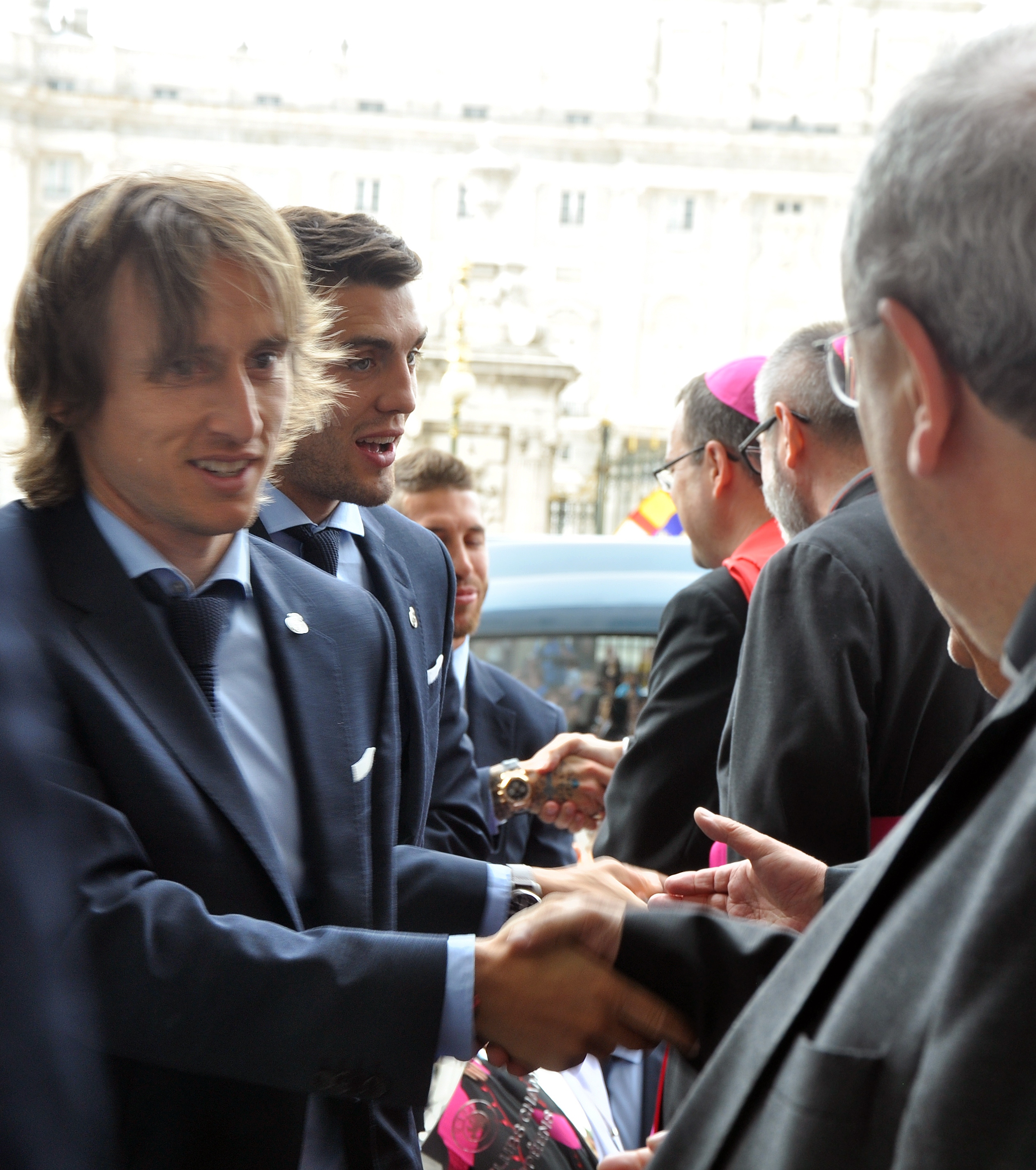
Dinamo Zagreb
- Prva HNL: 2005-06, 2006-07, 2007-08
- Croatian Cup: 2006-07, 2007-08
- Croatian Super Cup: 2006
Real Madrid
- La Liga: 2016-17, 2019-20, 2021-22, 2023-24
- Copa del Rey: 2013-14, 2022-23
- Supercopa de España: 2012, 2017, 2020, 2022, 2024
- UEFA Champions League: 2013-14, 2015-16, 2016-17, 2017-18, 2021-22, 2023-24
- UEFA Super Cup: 2014, 2016, 2017, 2022, 2024
- FIFA Club World Cup: 2014, 2016, 2017, 2018, 2022
- FIFA Intercontinental Cup: 2024
8.2. International honors
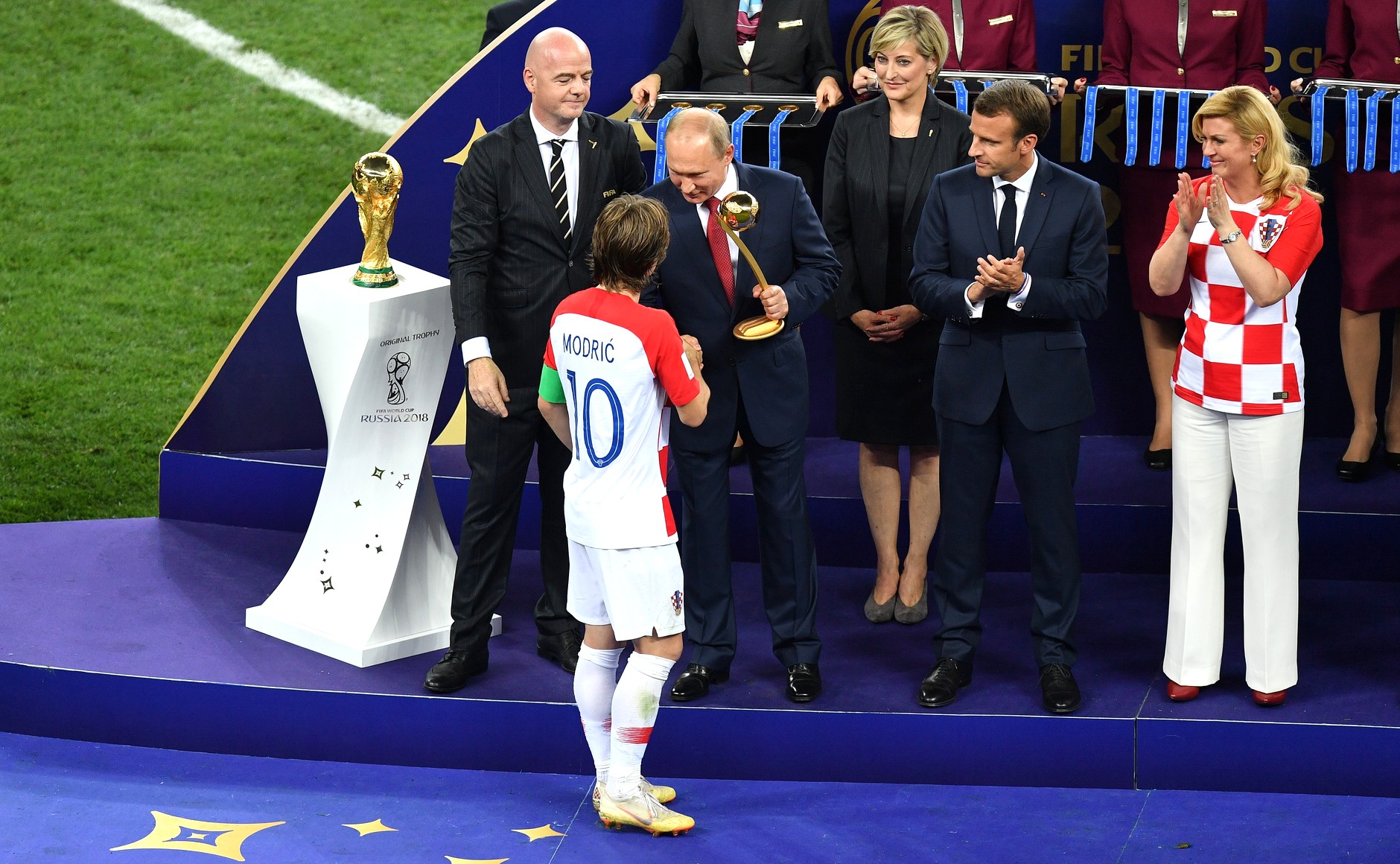
Croatia
- FIFA World Cup runner-up: 2018; third place: 2022
- UEFA Nations League runner-up: 2022-23
8.3. Individual honors
- Bosnian Premier League Player of the Year: 2003
- Best Croatian U-21 player: 2004
- Croatian Football Hope of the Year: 2004
- Croatian Footballer of the Year: 2007, 2008, 2011, 2014, 2016, 2017, 2018, 2019, 2020, 2021, 2022, 2023, 2024
- HNL's Footballer of the Year: 2007
- Prva HNL Player of the Year: 2007
- SN Yellow Shirt Award: 2007-08
- UEFA European Championship Team of the Tournament: 2008
- Tottenham Hotspur Player of the Year: 2010-11
- IFFHS World Team of the Decade: 2011-2020
- IFFHS UEFA Team of the Decade: 2011-2020
- UEFA Champions League Squad of the Season: 2013-14, 2015-16, 2016-17, 2017-18, 2020-21, 2021-22
- La Liga's Best Midfielder: 2013-14, 2015-16
- Football Oscar for Best Croatian Player: 2013, 2014, 2015, 2016, 2017, 2018, 2019, 2020, 2021, 2022, 2023
- FIFA FIFPRO World 11: 2015, 2016, 2017, 2018, 2019, 2022
- La Liga Team of the Season: 2015-16, 2021-22, 2022-23
- UEFA La Liga Team of the Season: 2015-16
- FIFA Club World Cup Silver Ball: 2016
- ESPN Midfielder of the Year: 2016, 2017, 2018
- UEFA Team of the Year: 2016, 2017, 2018
- UEFA Champions League Midfielder of the Season: 2016-17, 2017-18
- IFFHS Men's World Team: 2017, 2018, 2022
- FIFA Club World Cup Golden Ball: 2017
- FIFA World Cup Golden Ball: 2018
- FIFA World Cup Fantasy Team: 2018
- FIFA World Cup Dream Team: 2018
- UEFA Men's Player of the Year Award: 2017-18
- The Best FIFA Men's Player: 2018
- IFFHS World's Best Playmaker: 2018
- Goal 50: 2017-18
- Ballon d'Or: 2018
- World Soccer Player of the Year: 2018
- The Guardian Best Footballer in the World: 2018
- AIPS Athlete of the Year: 2018
- Dongqiudi Player of the Year: 2018
- HNS Trophy for Best Croatian Player: 2018
- HOO Sportsman of the Year: 2018
- SN Sportsman of the Year: 2018, 2022
- Franjo Bučar State Award for Sport - Yearly Award: 2018
- Golden Foot: 2019
- Real Madrid Player of the Season: 2020-21
- ESM Team of the Year: 2021-22
- Marca Leyenda Award: 2022
- FIFA World Cup Bronze Ball: 2022
- FIFA World Series ACUD Cup: 2024 Best Player
8.4. Orders and special recognition
- Honorary citizen of the city of Zadar (2018) and Zadar County (2019)
- City of Zadar Award: 2018
- Order of Duke Branimir: 2018
- Charter of the Republic of Croatia: 2024
q=Zadar, Croatia|position=right
q=Zagreb, Croatia|position=left